MD-PhD program grows in numbers, but also in potential and staying power
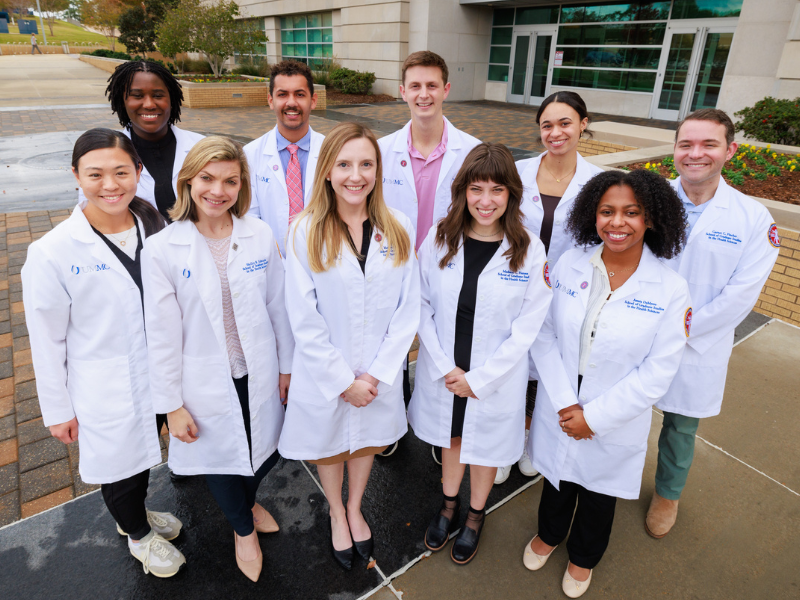
Editor's Note: A version of this article first appeared in the winter 2024-2025 issue of the Graduate Report.
Xavier Person is a budding researcher, a promising medical student and a man with a plan.
He’s earning a PhD at the same time he’s tackling his MD, one of five new students in the UMMC School of Graduate Studies in the Health Sciences’ (SGSHS) largest MD-PhD entering class since that dual degree program debuted in 2002 with just two students.
“At Mississippi State University, I did research for three years, so I knew what I was getting into from the research aspect,” said Person, a Brandon, Mississippi resident who earned his undergraduate degree in biomedical engineering, and whose research interests lie in neuroscience and psychology.
“With the MD-PhD, I can apply that to my research, and vice versa to my clinical practice.”
At 9 current students and 24 graduates, the growing MD-PhD program is a unicorn of sorts at the University of Mississippi Medical Center. Students complete three years (M1-M3) in the School of Medicine (SOM), three years in the SGSHS (G1-G3), then transition back to the SOM for their final year of study that overall spans seven years.
With guidance from faculty mentors, they mindfully align their clinical and research interests by completing laboratory rotations with graduate faculty during the M1-M3 years, selecting an area for graduate study during their M3 year, and dedicating three years to biomedical research with their mentors during their G1-G3 years.
First- and second-year students in the SOM can apply for admission to the MD-PhD program. The journey is eased for all by significant financial support: an annual stipend and tuition scholarships during their training period.
They’re training to become physician-scientists, their education focused on medical knowledge and the ability to productively investigate issues related to human disease.
Just as importantly, the Medical Center wants them to enrich the state’s health care base by staying at Mississippi's sole academic medical center for residency, fellowship and what comes next – or returning to Mississippi after finishing all or part of their training out of state.
To measure the program’s vitality, success and growth, look not just at this year’s entering class, but the students who came before them, said Dr. Joshua Speed, associate professor of physiology and biophysics and the MD-PhD program director.
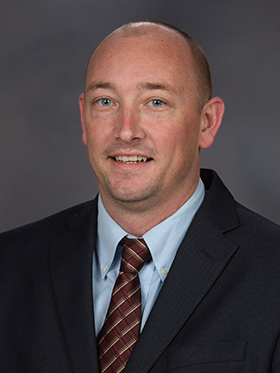
“They are definitely special students who have dedicated their lives to a long journey. You really have to be self-motivated,” Speed said. “Seven years is a big commitment, even though it really is a blink of an eye in one’s career.
“Whether in recruitment or when I hear a student bring up the length it takes, I ask our students where they’re going to be in 10 years. It will go by fast, and a little extra time is
nothing in the grand scheme of things,” he said. “This mentality is instilled during admissions, where we look for their long-term vision. Do they get excited when they talk about the research they’ve performed?
“The sky’s the limit for these students once they graduate.”
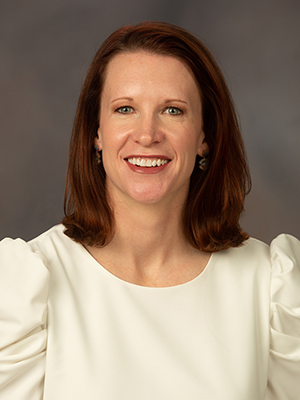
Speed “has done a phenomenal job continuing to grow this program,” said Dr. Sydney Murphy, dean of the SGSHS. “He’s rejuvenating it, and this year we have a strong incoming cohort.
“We’re excited about training a new group of physician-scientists who hopefully will stay in the state.”
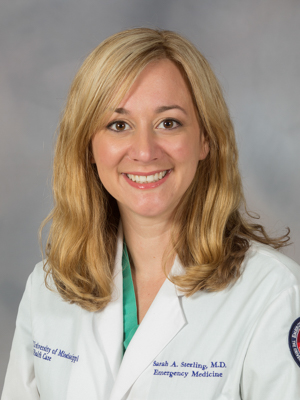
The MD-PhD program’s curriculum shifted over time, said Dr. Sarah Sterling, professor of emergency medicine, who with Dr. Licy Yanes Cardozo, professor in the departments of Pharmacology and Toxicology and Medicine/Endocrinology, work with the MD-PhD program.
“Previously, students completed their preclinical work in medical school and then transitioned to the graduate phase, where they spent three years focused on their PhD work,” she said. “The students would then transition back to the medical school and finish their two clinical years. While this provided excellent training, the MD-PhD students would enter their PhD work without much clinical experience.
“Currently, students complete their first three years of medical school, including M3 clinical rotations. This allows them to enter their graduate phase with clinical insight and knowledge that shapes and enhances their research.”
The program’s growth is being driven not just by a particular year’s enrollment, but its progress going forward.
“We hope to continue enrolling an average of three per class. With great support from the SOM and SGSHS, we hope that in seven years there will be 21 students across all classes,” Speed said.
Earning the MD-PhD wasn’t on the horizon for M3 Meredith Johnson during her first year of medical school. Speed, with help from Dr. Demondes Haynes, SOM associate dean for admissions, asked her to consider it. When she said yes, that grew the size of the Class of 2030 from one to two.
“I thought about how I’d like to do translational research and run clinical trials in the future – to go between the clinical world and the research side,” said Johnson, a metro Jackson, Mississippi resident who will pursue a PhD in neuroscience.
“Most of my time now is taken up with medical school, but I do meet with my graduate school mentor (Dr. Kevin Freeman, associate professor in the Department of Psychiatry and Human Behavior’s Division of Neurobiology and Behavior Research) every two weeks to talk about the lab and what I’ll be focusing on.”
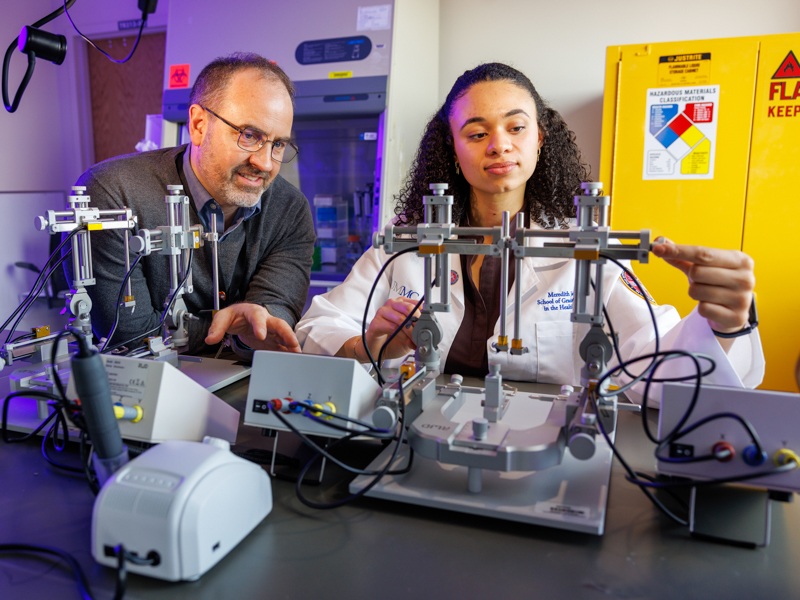
Another goal for the program is to attain a Medical Scientist Training Program designation from the National Institutes of Health that would spark even more growth and national recognition, Speed said.
“Having that designation would allow us to continue our success of attracting the best and the brightest,” Speed said.
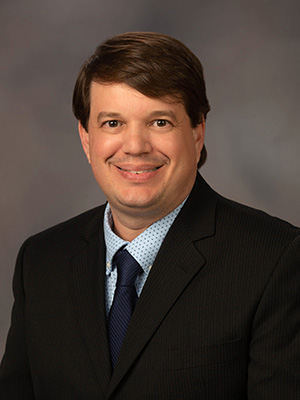
“It would give us the opportunity to expand our programs,” said Dr. Lee Bidwell, UMMC associate vice chancellor for research.
“An NIH training grant is an excellent goal for the program because it would allow us to add positions for more students, and having a peer-reviewed, NIH-funded program provides external validation of what we already know internally is an excellent medical scientist training program,” Bidwell said.
“A lot of residencies are developing their own physician-scientist training program and giving those fellows dedicated time for research,” Speed said. “Typically, residencies are almost 100 percent clinical, with very little research time. A physician-scientist training program allows time for trainees to develop a much more rigorous research program.”
Shelley Rae Edwards, the sole 2025 graduate of the MD-PhD program, in residency in plastic surgery. She benefited from the blossoming over time of the MD-PhD program and its research opportunities.
“We’ve had several different program directors, all of which have been wonderful advisors and mentors,” said Edwards, who grew up in Maben, Mississippi. “They’ve worked with each other for very positive change. It’s been really great how much we’ve gained from each of them serving as a leader and being able to build off where we started moving forward.”
Freeman was her research mentor. “He’s been a wonderful mentor, colleague and friend. I started undergraduate research in his lab,” said Edwards, whose PhD is in neuroscience. “I spent many an hour in that room.”
Her clinical mentor was Dr. Peter Arnold, professor and division chief of plastic surgery. “He has been incredibly present and a big part of all things PhD,” she said.
Long Beach, Mississippi native Katheryn Lett was the SGHSH’s only 2024 MD-PhD graduate. She is grateful for the rich relationships with faculty along the way, and she chose to stay at UMMC for her pediatrics residency.
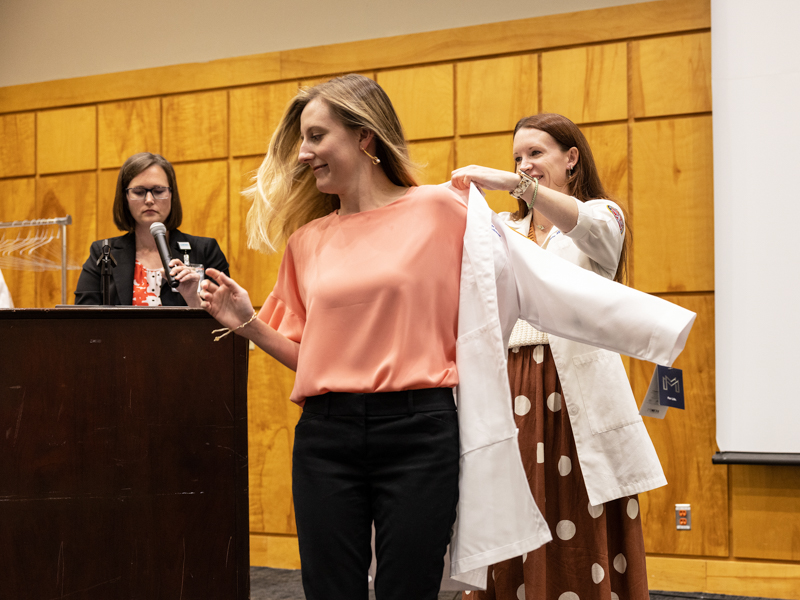
“Before Dr. Speed took over, Dr. Hanna Broome was program director,” Lett said. “She did a wonderful job of doing more recruiting for the program. She was quick to find us answers to questions, and to help us with general life stuff that happens outside of the PhD.
“It’s been a lot of work on (the program directors’) part in just getting the word out about the MD-PhD program.”
In earning her PhD in cell molecular biology, Lett said, “one of the big advantages was being in school for three more years. I grew a lot as a person in those extra years, and when I came back to the medicine side, I was more confident. I could apply what I learned to clinical situations.”
“As we grow the program and have more students, the more of a presence they will have,” Speed said. “The long-term goal is to develop a pipeline of clinician-scientists and to get them back to UMMC after they’ve had rigorous training.”
“The more we can get students involved in their training here, the more likely they will come back,” Bidwell said. “The MD-PhD program is a great way to get them highly involved in the research mission, and the more varied training experiences they get, the more likely they are to be invested.”
That pipeline is producing. Currently, there are eight MD-PhD graduates who are in fellowship or on faculty at UMMC in addition to two practicing in Mississippi.
A decade from now, Speed said, “the hope is that we have clinician-scientists who have been rigorously trained in one of the harshest clinical environments that you can encounter, and a research environment that is second to none.
“People don’t realize that we have everything and more in Mississippi that investigators have at Yale or Harvard when it comes to support of the research mission.”
“Our research opportunities span from bench research to population studies, offering a unique and diverse range of experiences as the landscape becomes increasingly complex,” Yanes Cardozo said. “Our MD-PhD graduates are uniquely equipped to lead with compassion and innovation in this ever-evolving field.”
Where does Lett see herself in 10 years?
“I really want to be able to see patients and do research, an even 50-50 split,” she said.
“And I would really like to stay here. My husband has a job here, and we have a 2-year-old son. We bought a house in Madison. We are perfectly happy here.
“I hope to be a faculty member involved in the MD-PhD program, and I could do a lot of good in that position,” she said. “Having someone who has actually been there when you’re trying to navigate your way would be really helpful.”


